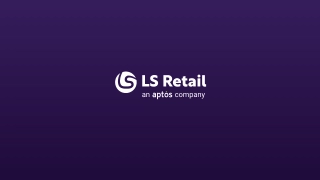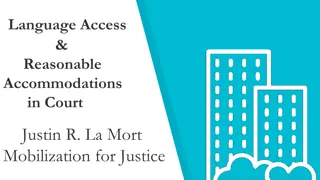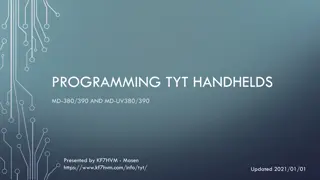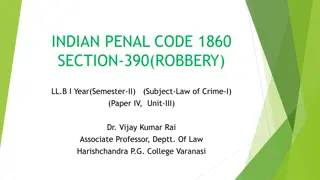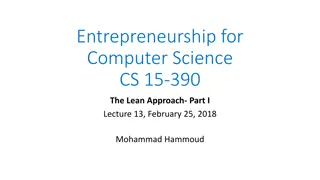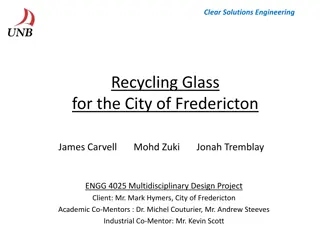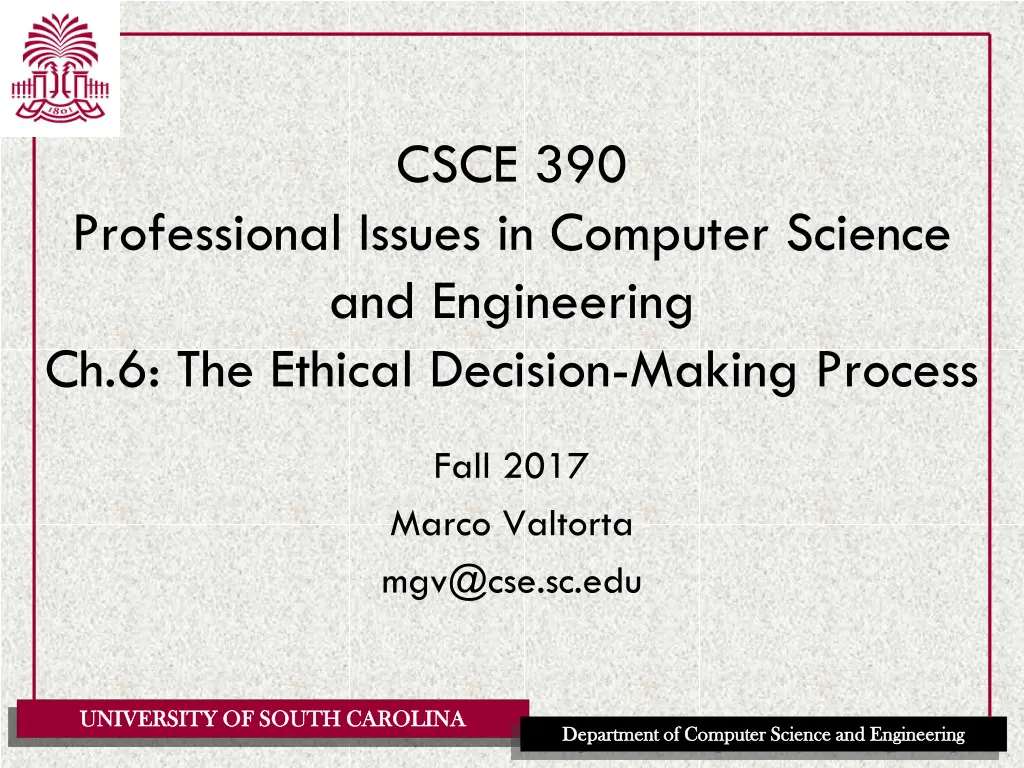
Ethical Decision-Making in Journalism: A Comprehensive Framework
Explore a structured framework for ethical decision-making in journalism, emphasizing key steps from recognizing ethical issues to evaluating alternative actions and reflecting on outcomes. Learn how to approach ethical dilemmas effectively and responsibly.
Download Presentation

Please find below an Image/Link to download the presentation.
The content on the website is provided AS IS for your information and personal use only. It may not be sold, licensed, or shared on other websites without obtaining consent from the author. If you encounter any issues during the download, it is possible that the publisher has removed the file from their server.
You are allowed to download the files provided on this website for personal or commercial use, subject to the condition that they are used lawfully. All files are the property of their respective owners.
The content on the website is provided AS IS for your information and personal use only. It may not be sold, licensed, or shared on other websites without obtaining consent from the author.
E N D
Presentation Transcript
CSCE 390 Professional Issues in Computer Science and Engineering Ch.6: The Ethical Decision-Making Process Fall 2017 Marco Valtorta mgv@cse.sc.edu UNIVERSITY OF SOUTH CAROLINA UNIVERSITY OF SOUTH CAROLINA Department of Computer Science and Engineering Department of Computer Science and Engineering
Why a Process? To document how you decided To help obtain a better decision UNIVERSITY OF SOUTH CAROLINA UNIVERSITY OF SOUTH CAROLINA Department of Computer Science and Engineering Department of Computer Science and Engineering
IRAC A methodology for legal analysis Issue Rule Application Conclusion UNIVERSITY OF SOUTH CAROLINA UNIVERSITY OF SOUTH CAROLINA Department of Computer Science and Engineering Department of Computer Science and Engineering
A Framework for Ethical Decision Making in Journalism 1. Start with an open mind 2. Get all the facts you can 3. Listen to what your gut is saying 4. Identify what duties are at stake 5. Find out what kind of conflict you re facing 6. Brainstorm and analyze 7. Reach a conclusion---and try to reach consensus with co- workers too 8. Try to minimize whatever harm your decision might cause 9. Look toward the future UNIVERSITY OF SOUTH CAROLINA UNIVERSITY OF SOUTH CAROLINA Department of Computer Science and Engineering Department of Computer Science and Engineering
A Framework for Ethical Decision Making Recognize an Ethical Issue Could this decision or situation be damaging to someone or to some group? Does this decision involve a choice between a good and bad alternative, or perhaps between two "goods" or between two "bads"? Is this issue about more than what is legal or what is most efficient? If so, how? Get the Facts What are the relevant facts of the case? What facts are not known? Can I learn more about the situation? Do I know enough to make a decision? What individuals and groups have an important stake in the outcome? Are some concerns more important? Why? What are the options for acting? Have all the relevant persons and groups been consulted? Have I identified creative options? Evaluate Alternative Actions Evaluate the options by asking the following questions: Which option will produce the most good and do the least harm? (The Utilitarian Approach) Which option best respects the rights of all who have a stake? (The Rights Approach) Which option treats people equally or proportionately? (The Justice Approach) Which option best serves the community as a whole, not just some members? (The Common Good Approach) Which option leads me to act as the sort of person I want to be? (The Virtue Approach) Make a Decision and Test It Considering all these approaches, which option best addresses the situation? If I told someone I respect-or told a television audience-which option I have chosen, what would they say? Act and Reflect on the Outcome How can my decision be implemented with the greatest care and attention to the concerns of all stakeholders? How did my decision turn out and what have I learned from this specific situation? UNIVERSITY OF SOUTH CAROLINA UNIVERSITY OF SOUTH CAROLINA Department of Computer Science and Engineering Department of Computer Science and Engineering
Steps 1-3 1. Briefly describe the ethical issues in this case 2. Identify the stakeholders in this case and tell what you think each of them would like to see as an outcome 3. (A) Propose three possible solutions to the case (two extremes and a compromise). Mark them a), b), and c). (B) Give a best-case and worst-case outcome for each solution and, for each solution, indicate whether you could tolerate the worst- case outcome. (C) Which of the three solutions would you choose? UNIVERSITY OF SOUTH CAROLINA UNIVERSITY OF SOUTH CAROLINA Department of Computer Science and Engineering Department of Computer Science and Engineering
Steps 4-5 4. (A) Would you be willing for everyone to be permitted to use the solution you chose? Explain. (B) Does this solution treat people as ends rather than as means only? Explain. 5. (A) Is this solution in accord with what is natural (e.g., in accord with human nature, the environment, or the inherent purpose of anything else involved in the case)? Explain. (B) Is this solution balanced between an approach that might be excessive on one end and deficient on the other? Explain. UNIVERSITY OF SOUTH CAROLINA UNIVERSITY OF SOUTH CAROLINA Department of Computer Science and Engineering Department of Computer Science and Engineering
Steps 6-7 6. (A) Would there be majority agreement that this solution is the most efficient means to the end? Explain. (B) Will it produce the greatest good for the greatest number of people? Explain. 7. (A) Is this solution the one you feel most committed to in your conscience regardless or whether or not it benefits you personally? Explain. (B) Do you choose this solution in an autonomous manner, free from the influence of others? Explain. File:Sanzio 01 Heraclitus.jpg UNIVERSITY OF SOUTH CAROLINA UNIVERSITY OF SOUTH CAROLINA Department of Computer Science and Engineering Department of Computer Science and Engineering
Step 8 Which philosophical belief system do you feel was most influential in your solution to this case? Why? UNIVERSITY OF SOUTH CAROLINA UNIVERSITY OF SOUTH CAROLINA Department of Computer Science and Engineering Department of Computer Science and Engineering
The Culture Clash on the Net Case http://home.utah.edu/~nahaj/ethics/culture.clash. html, accessed 2014-10-02, written 1996, updated 2000 UNIVERSITY OF SOUTH CAROLINA UNIVERSITY OF SOUTH CAROLINA Department of Computer Science and Engineering Department of Computer Science and Engineering

